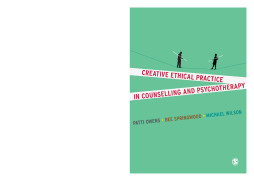
BOOK
Creative Ethical Practice in Counselling & Psychotherapy
Patti Owens | Bee Springwood | Michael Wilson
(2012)
Additional Information
Book Details
Abstract
Can I be a creative therapist without overstepping boundaries and risking complaints?
Can I practise safely and ethically whilst remaining true to my humanistic values?
This book answers 'Yes' by offering a safety net to trainees and therapists working in the context of today's 'complaints culture'. Exploring what safe and creative practice means in relation to the key cornerstones in therapy, the authors offer practical guidance to assist the reader in reflecting on and negotiating the challenges of boundaries, legalities and defensive practice. Creative Ethical Practice for Counselling & Psychotherapy considers the necessary structures and processes that must inform creative, humanistic practice for it to be a safe, ethical therapeutic framework.
Packed with reflective exercises, summaries, case examples and step-by-step guidance, this book takes the reader from establishing the therapeutic relationship to worst-case scenarios like complaints procedures and legal action. It is essential reading for legal & ethical modules on all counselling courses.
Patti Owens, Michael Wilson and Bee Springwood are all humanistic and integrative therapists and members of the UK Association of Humanistic Psychology Practitioners (UKAHPP) as well as the United Kingdom Council for Psychotherapy (UKCP).
'An exciting and important book, which demonstrates that ethical practice can be - in fact, must be - alive and creative as well as safe and boundaried' -
Nick Totton, author of Wild Therapy
'This book reminded me of the inspirational work of James Bugenthal, no praise is higher. It is both a helpful and practical guide, encouraging a deep enquiry into the values that counsellors and psychotherapists bring to their work, and at the same time a source of wisdom in its own right, one that draws on the evidently rich experience of the authors. Experienced practitioners, reviewing and reflecting on their practice, have much to gain from it, so too do senior trainees approaching accreditation. It has a special value to trainers by means of a highly imaginative and accessible use of exercises and vignettes that help capture the true nature of the therapeutic encounter' -
Sean Maloney, UKCP registered psychotherapist and supervisor and Chair of Ethics for the Karuna Institute
